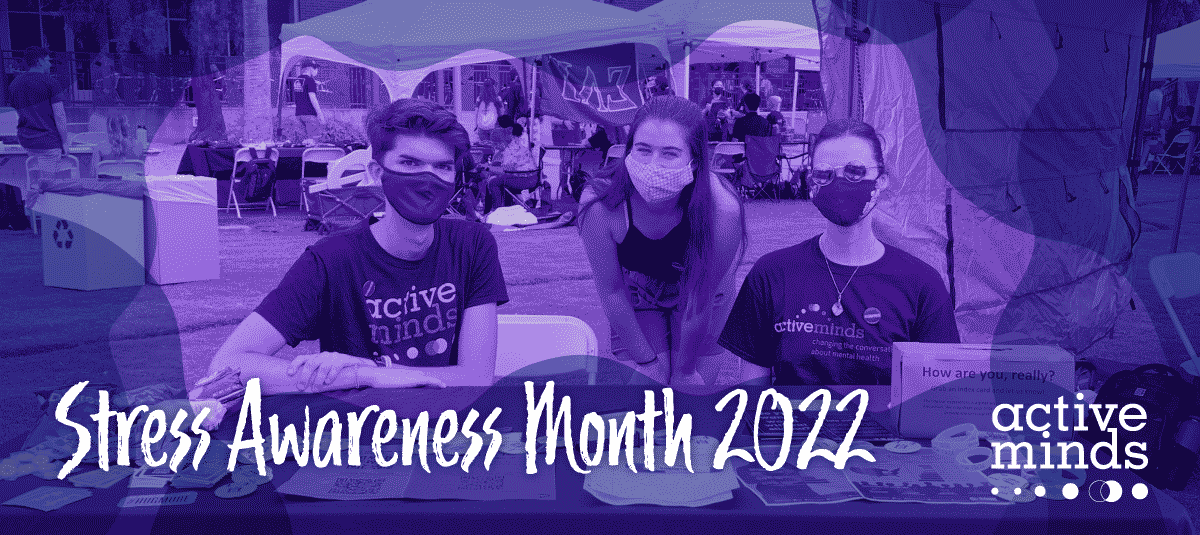April is Stress Awareness Month, a time to take a step back and shed light on the causes and consequences of stress, one of the most common mental health topics confronting students. It’s the time of year when spring break feels like a distant memory and final exams loom right around the corner, leaving many students feeling overwhelmed and burned out. Most of us know exactly what stress feels like – a dull nagging dread over what is to come. While this feeling isn’t unique, many students don’t feel empowered to tackle their own stress and need support in finding ways to recognize, address, and manage it.
I’ve always found that the first step to tackling stress is finding the source, which is often much easier said than done. During a busy midterm season, I found myself facing both academic stress and social stress. Not only did I feel like I was writing papers and studying for tests in perpetuity, but I also was working through a difficult social situation at the same time. Academics and social relationships are only two of the many stressors students may face as they navigate their time in school. In addition to the normal stressors faced by young adults, students of color and lesbian, gay, bisexual, transgender, queer, and questioning (LGBTQ+) students can face even more intense causes of stress than their white or cisgender/heterosexual peers, such as the accumulation of societal microaggressions or even outright discrimination. As mental health advocates, we must acknowledge the unique struggles faced by marginalized groups in our campus communities and support them in advocating for change to address these stressors. No matter where your stress comes from, know that the source is valid and there are ways to address it through healthy coping mechanisms.
While at times it may feel easier to ignore the stressors in your life, the dangers that can come from that kind of delay are clear. For example, when my stress gets out of hand, one of the first things I notice is a sort of pseudo-paralysis. It feels impossible to start even the simplest of tasks knowing what all must be done. This often leads to procrastination, which compounds the issue. Increased stress can lead us to lose track of our other priorities, like diet, physical activity, and sleep. Letting these factors deteriorate may only worsen the effects of stress on the body, so we must maintain these factors as a form of self-care. While it may seem like a difficult cycle to break, prioritizing self-care supports our mental health in the long term.
Once we’ve found the source of our stress and accepted the need to address it in a timely way, there are many things we can do individually and collectively to support our own stress management, as well as our peers’. For example, Active Minds chapters across the country are working to provide resources to help students manage their stress, through toolkits such as the Stress Less Week Guide. At the University of Arizona, our chapter has worked with other student groups to provide mindfulness meditation workshops, creative activities, kindness-spreading events, and more! This year, we’re also working with our student government to bring service dogs to our campus for a wellness event during finals week.
So if you’re a student and haven’t already, connect with your local Active Minds chapter (or consider starting one if your school doesn’t have one!). Chapters are an amazing community to be a part of and can serve as much-needed support as you learn to navigate the stressors of college life. That being said, here are a couple of personal stress-management ideas I’ve put to use to help me during this tumultuous semester:
- A Daily Checklist: A mental health provider recently recommended this activity to me. Every morning, I create a list of my three top priorities that day. Not only does this make the tasks at hand seem more manageable, but crossing things off a list is so satisfying! For an extra challenge, make one of your three tasks something you can do to recharge (read, go outside, or have lunch with a friend, for example!).
- Time in the Sun: Nothing helps me reset my internal stress level better than spending some time outdoors. Anything from running, hiking, or even just taking a walk outside can spark my motivation to take on my to-do list. If you live somewhere sweltering, like it is here in southern Arizona, consider going outside first thing in the morning to kickstart your day while escaping the heat!
- Getting Help: Sometimes, our stress can feel insurmountable. Don’t forget that it’s always okay to reach out to a mental health professional on- or off-campus when needed. Having the opportunity to talk to someone who listens, cares, and offers feedback has been incredibly powerful for me, and is for many other students as well.
I hope these ideas will inspire you to get ahead of your stress this semester. While we are intentionally focusing on stress awareness during April, we, as students, must remain proactive in managing our stress at all times, and that includes asking for help when needed! Happy de-stressing!
If you or someone you know is facing an immediate crisis, text “Brave” to 741-741 or call 1-800-273-TALK (8255) for 24/7 support.




